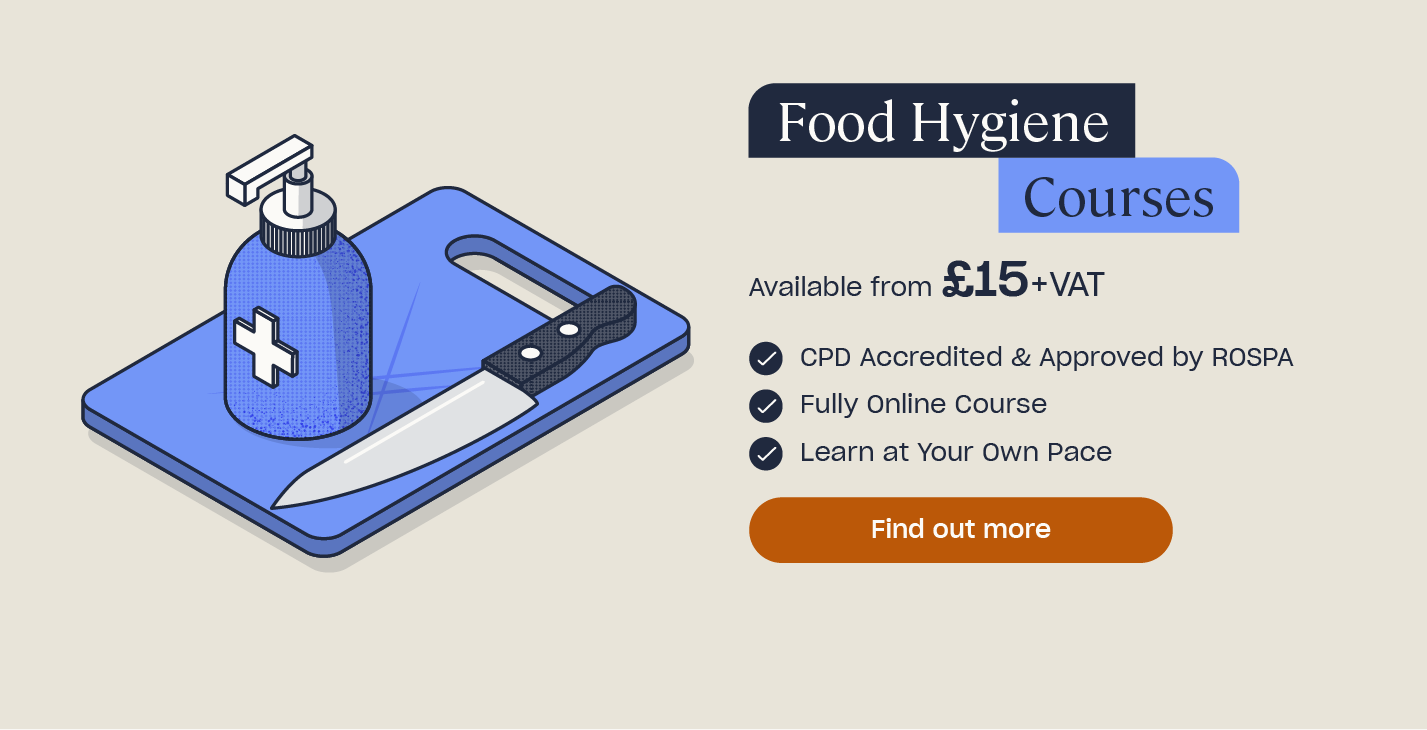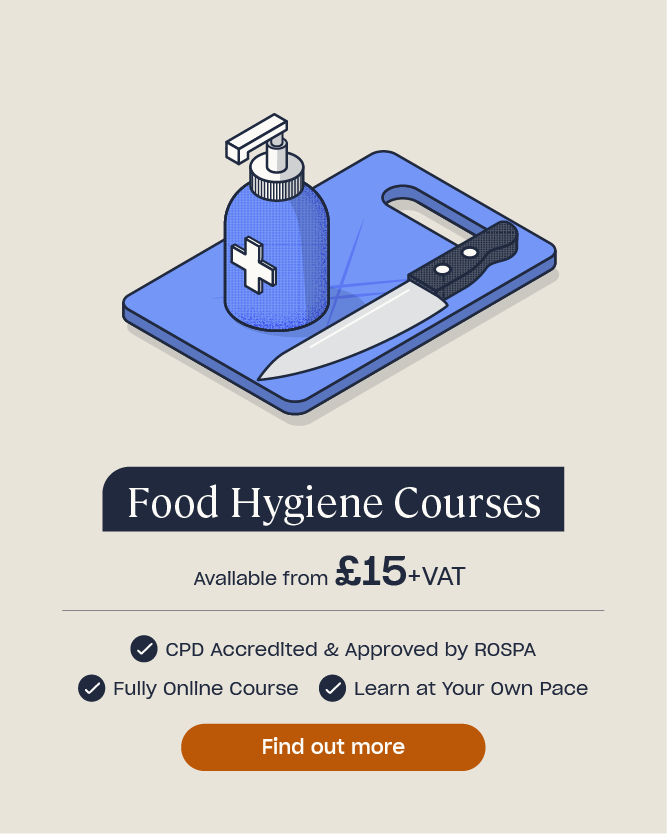Can You Reheat This?
We all want to save money, and bulk cooking and reheating food is an excellent way to make our meals go further. However, it’s important that we know how to reheat our food safely.
Throughout this article, we will explain what foods you should and shouldn’t reheat, how you should store them to stop the growth of bacteria and how you can reheat them to get the safest, tastiest results.
So, which foods are safe to reheat? Use the drop downs below to find out.
General Advice
For personal consumption, you must always reheat any dish until it’s piping hot throughout – at least 75 °C. If reheating food for use in a food business, it must be reheated to an immediate core temperature reading of at least 75 °C (England) or at least 82 °C (Scotland).
Note that, while frozen food can be reheated, it’s important to remember to thoroughly defrost it before reheating and ensure that it’s piping hot throughout. Remember to stir or turn food as it’s cooking to ensure that your food heats evenly.
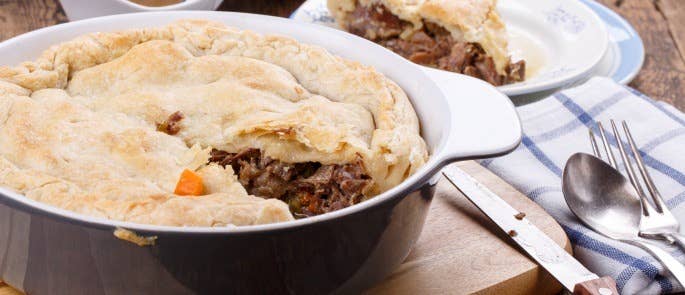
Store food properly and never reheat or consume any food that has been contaminated by raw food. You must only reheat food once and mustn’t freeze or refreeze reheated food.
Reheating Meat
Cooked meats are very easy foods to reheat. In general, they can be reheated easily and retain their texture and taste well. Use the drop downs below to find out more about how to safely reheat your favourite meats.
Can you reheat chicken?
Yes, you can safely reheat and consume chicken dishes. You can reheat chicken in any form, for example roasted chicken breast, chicken on the bone, or a chicken curry.
You can reheat chicken dishes using a microwave, oven, frying pan or slow cooker. As long as you heat it until it’s piping hot throughout and there are no cold spots, it will be safe to consume. If keeping a chicken dish to reheat, you must store it in the fridge or freezer within 2 hours, consume within 3 days and only reheat it once.
Top tips:
- Rather than reheating leftover roasted or grilled chicken, consider eating it cold in salads or sandwiches.
- As the weather becomes nicer, consider reheating chicken on your barbecue.
- No matter how you cook it, remember that chicken dishes must be reheated until piping hot throughout, at least 75 °C, only reheated once and consumed straight away.
- When reheating your chicken, you do not have to keep it in the same form. For example, roast chicken could become a chicken pie.
- You can even buy pre-cooked, refrigerated, chicken from the supermarket and reheat it at home, for example adding it to a chicken curry.
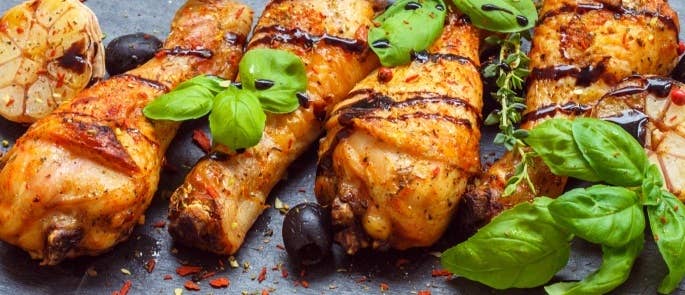
Can you reheat pork?
Yes, it’s safe to reheat pork dishes. However, it can be tricky to retain a good taste and texture when reheating dishes such as roast pork or pork chops, as the meat can become tough and dry. You can reheat pork safely in the microwave, oven or on the hob. Remember to ensure that it’s piping hot throughout before serving. If keeping a freshly cooked pork dish to reheat, you must store it in the fridge or freezer within 2 hours, consume within 3 days and only reheat it once.
Can you reheat sausages?
Yes, you can reheat sausages. The best methods are using the microwave or hob. Consider cutting your sausages in half length-ways before reheating, as this will help them heat through without burning or drying out.
You can also reheat sausages that are in a sauce (for example a sausage casserole) in the microwave, on the hob or in a slow cooker. Simply add a little water before heating to stop it drying out.
If keeping a sausage dish to reheat, you must store it in the fridge or freezer within 2 hours and consume within 3 days. No matter the dish you are reheating, it’s important to ensure that it’s piping hot throughout before serving and you must only reheat it once.

Top tips for reheating pork:
- Rather than reheating leftover pork, consider eating it cold in salads or sandwiches.
- As the weather becomes nicer, consider reheating pork on your barbecue.
- No matter how you cook it, remember that reheated pork dishes must be reheated until piping hot throughout, only reheated once and consumed straight away.
Can you reheat beef?
Yes, it’s safe to reheat beef dishes. The best methods are using the microwave or hob as reheating beef dishes in the oven can make them dry and tough. Reheated beef comes back best when it’s in a sauce, so consider reheating leftover roast beef in gravy, or adding it to a casserole or pie. Beef dishes that are already in a sauce, such as ragù, reheat well as they are. Simply add a little water and reheat in the microwave, on the hob or in a slow cooker.
If keeping a sausage dish to reheat, you must store it in the fridge or freezer within 2 hours and consume within 3 days. No matter the dish you are reheating, it’s important to ensure that it’s piping hot throughout before serving and you must only reheat it once.
Top tips:
- Consider eating leftover roast beef or steak cold in salads or sandwiches.
- No matter how you cook it, remember that reheated beef dishes must be reheated until piping hot throughout, at least 75 °C, only reheated once and consumed straight away.
Reheating Fish
It’s vital that you handle and prepare all seafood properly, as incorrectly prepared and stored seafood can be very dangerous to consume. If you are planning to reheat seafood, you must refrigerate it as quickly as possible after cooking, ideally within 1 hour, and consume within 1-2 days.
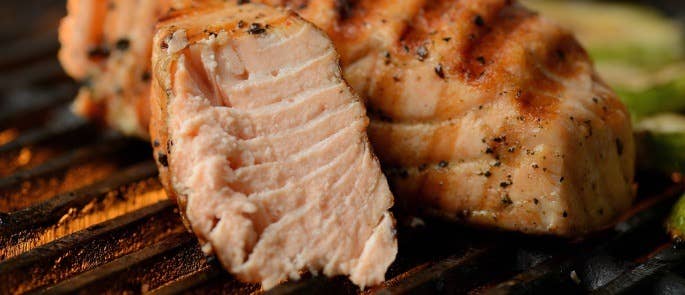
Can you reheat prawns?
You can buy both raw and cooked prawns from the supermarket.
- Cooked supermarket prawns can be eaten both cold and hot depending on the dish you would like to use them in. If you choose to heat them up, ensure that they are piping hot throughout before serving. You should avoid reheating a dish made from heated, pre-cooked prawns.
- Raw supermarket prawns must be cooked before eating. You can cook them into a prawn dish and store any leftovers. Dishes made from cooked, raw supermarket prawns can be reheated as long as the original dish has been handled, cooked and stored correctly (put in the fridge or freezer within 1 hour of cooking and consumed within 1-2 days). You can reheat dishes made from cooked, raw supermarket prawns, in the oven, microwave or on the hob. Ensure they are piping hot before serving and only reheat them once.
Can you reheat salmon?
Yes, you can reheat salmon. Understanding how to reheat your salmon properly can help you enjoy leftovers safely, while retaining the excellent taste and texture of a salmon fillet. If you are planning on keeping your salmon fillet, you should cool it within an hour of cooking, store it in the fridge and consume within 2-3 days.
To reheat your salmon, wrap it loosely in tin foil and oven bake it, or fry it on the hob. Reheated salmon must be piping hot before serving and only reheated once.
Top tips:
- Consider eating your leftover salmon fillets cold in summery salads. Cold salmon has a great taste and texture and is perfectly safe to eat as long as you keep it properly. To keep your salmon safely, cool it within an hour of cooking, store it in the fridge and consume within 2-3 days.
- As the weather becomes nicer, consider reheating salmon on your barbecue.
- When reheating salmon, you don’t have to keep it in the same form. For example, a salmon fillet could be used in a fish pie or fishcakes.
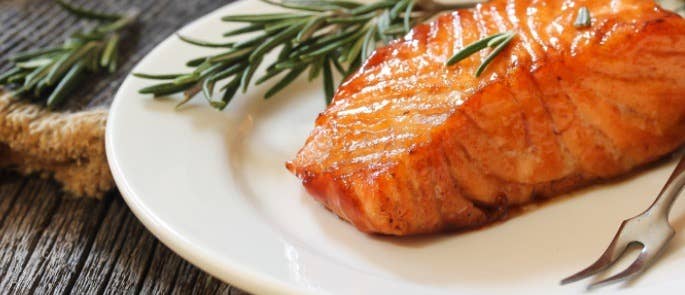
Can you reheat fish fingers?
Yes, you can reheat fish fingers, but it’s best to stay away from the microwave. Microwaving cold, cooked fish fingers will ruin the texture and make them go soggy.
The best way to reheat your fish fingers is in the oven or on the hob. Cook them on some foil in the oven, or with some butter on the hob, and they will come out crispy and delicious.
If you are planning to store and reheat your fish fingers, you must refrigerate them within 2 hours of first cooking them. Remember that you must reheat and enjoy your fish fingers within 1-2 days, and ensure they are piping hot before serving. You should only reheat fish fingers once.
Reheating Eggs
Eggs are very versatile and can be cooked in several different ways. However, not all types of cooked eggs lend themselves to reheating. For more information, use the drop downs below.
Can you reheat boiled eggs?
Yes, you can reheat hard boiled eggs, but you should never use the microwave. Hard boiled eggs can explode if you reheat them in the microwave, which can be a serious hazard.
Instead, place them, still in their shell, in a bowl and cover them with boiling water. Allow them to sit for several minutes before draining and serving. You should refrigerate boiled eggs within 2 hours and consume cold or reheated within a week. Do not reheat boiled eggs more than once.
Can you reheat an omelette?
Yes, you can reheat an omelette. If you are planning to reheat an omelette, you must refrigerate it within 2 hours of cooking and reheat it within 1-2 days. The best way to reheat an omelette is in the microwave, however you can also reheat it in the oven, on the hob or under the grill. Ensure your omelette is piping hot before serving. You must only reheat your omelette once.
While omelettes can be reheated, eggs are very sensitive to temperature, so reheating can leave them dry and tough. Consider enjoying your omelette cold instead. If you plan to eat you pre-cooked, cold omelette, you must refrigerate it within 2 hours of cooking and consume it within 1-2 days.

Can you reheat fried eggs?
No, reheating fried eggs is not recommended. No matter how they are reheated, or for how long, they will develop a tough, rubbery texture and will not be enjoyable.
Instead, consider eating pre-cooked fried eggs cold. If you plan to do this, fried eggs should be cooked until the yolks are firm, refrigerated within 2 hours of cooking and consumed within 1-2 days.
Can you reheat poached eggs?
Yes, you can reheat poached eggs. Once you have poached your eggs, place them in a bowl of iced water immediately and store in the fridge. You can store them in the fridge for up to 2 days.
Reheat your eggs in a pan of boiling water until they are piping hot throughout, and only reheat them once.
Need a Course?
Our Food Hygiene Training is designed to ensure a comprehensive knowledge of all food safety and hygiene procedures.
Reheating Dairy
Dairy is a staple in many meals. Use the drop downs below to find our more about how to reheat your dairy products safely.
Can you reheat cheese?
Yes, in general, foods containing cheeses, such as pizza, lasagne and other pasta dishes, can be reheated safely. You can reheat cheese containing dishes in the microwave, on the hob, in the oven or under the grill. If you are planning to reheat a dish containing cheese you must refrigerate it within 2 hours, consume it within 3 to 4 days (1 to 2 if it also contains fish) and only reheat it once. Ensure your dish is piping hot before serving.
Soft cheeses, like Camembert, pose a higher risk of food poisoning, so you should reheat with caution.

Can you reheat milk?
Yes, it’s safe to reheat milk. However, reheating milk can leave it with a rough, grainy texture and it loses sweetness. So while it’s safe, it’s tastier to just heat fresh milk instead. If you do plan to reheat milk, ensure you put it in the fridge as soon as it cools, store it in an air tight container and consume within 3 days.
Can you reheat quiche?
Yes, you can safely reheat quiche. To retain a crisp crust, it’s best to reheat your quiche in the oven. If you are planning to reheat a quiche, you must store it in the fridge within 2 hours, consume within 3 days and only reheat it once. Ensure your quiche is piping hot before serving.
Reheating Vegetables
In the drop downs below we have had a look at whether you can reheat some common vegetables.
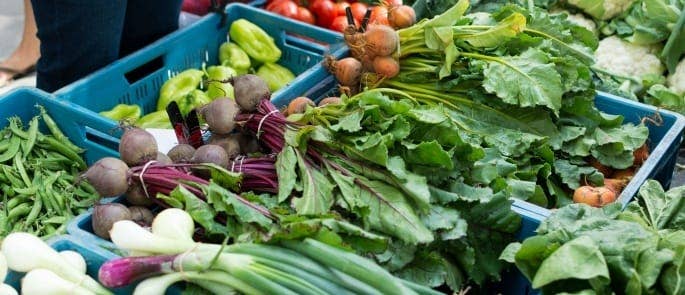
Can you reheat spinach?
Yes, you can reheat spinach. Many websites claim that you shouldn’t reheat spinach as, when reheating, nitrates can turn into nitrites and render your spinach toxic. In reality, the volume of nitrates in your spinach is dependent on many things, including the nitrate concentration of the soil where it was grown and how long you cook it for. Additionally, there is little evidence to suggest reheating spinach will have negative health impacts.
Can you reheat beetroot?
Yes, you can reheat beetroot. Many websites claim that you shouldn’t reheat beetroots as, similar to spinach, nitrates can turn into nitrites during reheating and render your beetroot toxic. The risk of this, however, depends on many other factors, such as the nitrate present in the soil where it was sourced and how long it has been cooked. It is unlikely that reheating beetroot will be hazardous to your health.
However, when you reheat beetroot, the taste and texture are diminished and they aren’t as enjoyable to consume. Therefore, if you have any leftovers, consider eating them cold in salads instead.
Can you reheat baked beans?
Yes, you can reheat baked beans. Store leftover baked beans in an airtight, plastic or glass container and refrigerate within 2 hours. Consume them within 3 days and ensure they are piping hot throughout before serving. You should only reheat baked beans once and should never refrigerate them in their metallic container.
Reheating Starchy Foods
Starchy foods, specifically rice and potatoes, can be tricky to reheat. Use the drop downs below to find out how you can store and reheat your starchy foods safely.
Can you reheat rice?
Yes, you can reheat rice. However, rice is a high risk food as uncooked rice can contain Bacillus cereus spores. These spores can survive even when rice is cooked. Therefore, it’s vital to cook, store and reheat rice properly to avoid creating the optimum conditions for any Bacillus cereus spores to grow into bacteria and multiply. If Bacillus cereus bacteria is allowed to multiply, it can cause food poisoning.
If you are planning to save and reheat rice, you should cool it as quickly as possible (under an hour) and store it in the fridge in a sealed container. You should aim to reheat and consume it within one day and never reheat a rice dish more than once. You can reheat rice in the microwave, on the hob or in the oven but you must check it’s piping hot throughout before serving. Remember to stir the dish to ensure it heats up evenly.

Can you reheat potatoes?
Yes, potatoes can be reheated, but it’s essential that you store them properly to prevent the growth of Clostridium botulinum bacteria. Clostridium botulinum bacteria can cause botulism, a serious disease that can result in death. Incorrectly storing your potatoes can give the bacteria the perfect conditions to thrive, resulting in your potatoes becoming a serious health risk. Therefore, you should store your plain potatoes in sealed plastic bags or containers within one hour of cooking. Never wrap them in tin foil.
Avoid reheating crispy potatoes, like roasted, pan fried or chipped potatoes, in the microwave as they will go soggy. Instead, opt for the hob, oven or grill. Dishes containing mashed or boiled potatoes are best suited to the microwave.
Reheat and consume plain potatoes in one week, potato dishes containing meat or dairy within 3 days, and potato dishes containing fish within 1-2 days. You must only reheat them once. Ensure your potatoes or potato dish is piping hot before serving.
Can you reheat pasta?
Yes, you can reheat pasta. Pasta can be cooked and stored plain, or with sauces, and either can be reheated safely. If you are planning to keep pasta to reheat, it should be stored in the fridge within 2 hours of cooking (within one hour if cooked with fish). You should reheat and consume pasta within 5 days (pasta that’s plain or with vegetable sauces), 3 days (pasta cooked with meat or dairy) or 1-2 days (pasta cooked with seafood). Ensure your pasta is piping hot throughout before serving.
Top tips:
- Cooked, plain pasta without sauce can be reheated easily by placing it in a pan of boiling water for 35 – 40 seconds. Avoid reheating plain pasta without sauce in the oven or microwave as it will dry out and become tough.
- Add a little water to the pan or dish before reheating pasta with tomato based sauces. You can reheat these in a pan, the oven or microwave, and the addition of some water will thin out the sauce and stop it drying out.
- If you are reheating pasta with a cream sauce, add a little cream when reheating. Reheat cream-based pasta dishes on the hob over a low heat.
What To Read Next:
- Can I Cook This From Frozen?
- How to Reduce Food Waste at Home
- Food Safety Myths and Facts
- Can I Freeze This & For How Long?
- How Long Does Food Last in the Freezer? A Storage Guide
- Answering Your FAQs About Egg Safety
- How Many Times Can You Reheat Food Safely?
- How to Defrost Food Safely
- Guidance on Storing Leftovers and Partly Opened Foods
- Level 2 Food Safety & Hygiene for Catering
- Microwave Safety Guide


